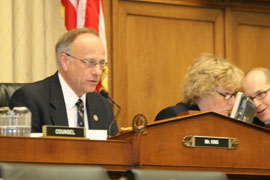Cronkite News has moved to a new home at cronkitenews.azpbs.org. Use this site to search archives from 2011 to May 2015. You can search the new site for current stories.
Republicans criticize new ‘recess’-like rules for jailing immigrants
WASHINGTON – House Judiciary subcommittee members grilled Immigration and Customs Enforcement officials Wednesday on new detention standards that they said read “more like a hospitality guideline for illegal immigrants.”
“Under this administration, detention looks more like recess,” said Rep. Lamar Smith, R-Texas, to open the hearing that Republican members dubbed the “Holiday on ICE.”
Critics on the Judiciary Subcommittee on Immigration Policy and Enforcement said ICE detention guidelines that took effect last month were costly, too easy on inmates and did not provide enough safeguards for correctional officers.
But an ICE official testified Wednesday that the new standards have produced “concrete changes” that have improved conditions and are appropriate for the range of inmates ICE holds, from criminals to asylum seekers and non-criminal detainees.
“We wanted to ensure that detainees receive adequate medical and mental health care and that detention facilities receive necessary federal oversight, and we wanted to do this in a fiscally prudent way,” said Kevin Landy, assistant director of ICE’s Office of Detention Policy and Planning.
The guidelines include provisions for prenatal care and preventive health services for women, gender-specific strip-searches, accommodations for dietary restrictions and religious observations, and greater access to outdoor recreation. They also limit the use of restraint on pregnant women, among other changes.
Under the new regulations, detainees can file complaints through one of three offices in ICE or the Department of Homeland Security.
But Smith complained that the rules had been drafted with heavy input from pro-immigrant groups that left “no protections against false accusations of abuse” against guards. He also pointed to the construction of a new $30 million facility in Texas that was providing “amenities” for inmates such as “resident advisers” instead of guards.
Michelle Brane, director of the detention and asylum program at the Women’s Refugee Commission, testified that the changes “should be welcomed.” They provide protections for detainees and ensure access to basic medical care, bringing ICE “closer to a minimum level compliant with obligations.”
“To imply that these … basic protections are appalling or a burden is simply wrong,” Brane said. “Revising its existing standards is not only necessary for the safety of the detainees, it’s a significant opportunity for ICE to create more efficient and effective enforcement.”
Rep. Zoe Lofgren, D-Calif., agreed.
“I think it’s very easy to pick on the most vulnerable people, and I think that’s some of what’s going on here today,” she said.
Lofgren added that the new ICE facility in Texas was built by a for-profit company, saving taxpayer dollars.
But a union leader for ICE officers called the new standards a “dangerous gamble at best.”
“We believe new detention standards proposed by ICE are at times unsafe for detainees and unsafe for employees,” said Chris Crane, the president of National ICE Council 118.
He said the union was not consulted during the development of rules that prohibit ICE officers from carrying handcuffs at some facilities and let detainees in street clothes and walk around workspaces at others, where they can learn search techniques by watching officers.
“Such approaches are imbalanced and ineffective,” said Crane, who called on ICE to work with the union to reach goals they had set of improving conditions.
Rep. Steve King, R-Iowa, said he calculated that it was about “20 times safer” to be in ICE custody than to be free on the street. Landy challenged the claim, saying King did not account for the age of detainees compared with the general population, among other things.
But Jessica Vaughan, policy director for the Center for Immigration Studies, said the new standards put Americans at risk by easing the “consequences of illegal immigration.”
“Of course no one wants to see people mistreated in detention, but this initiative goes too far,” Vaughan said.
Lofgren derided that suggestion.
“Is it too far not to shackle women as they give birth?” Lofgren asked. “Do you think that’s something that really protects the American people?”








